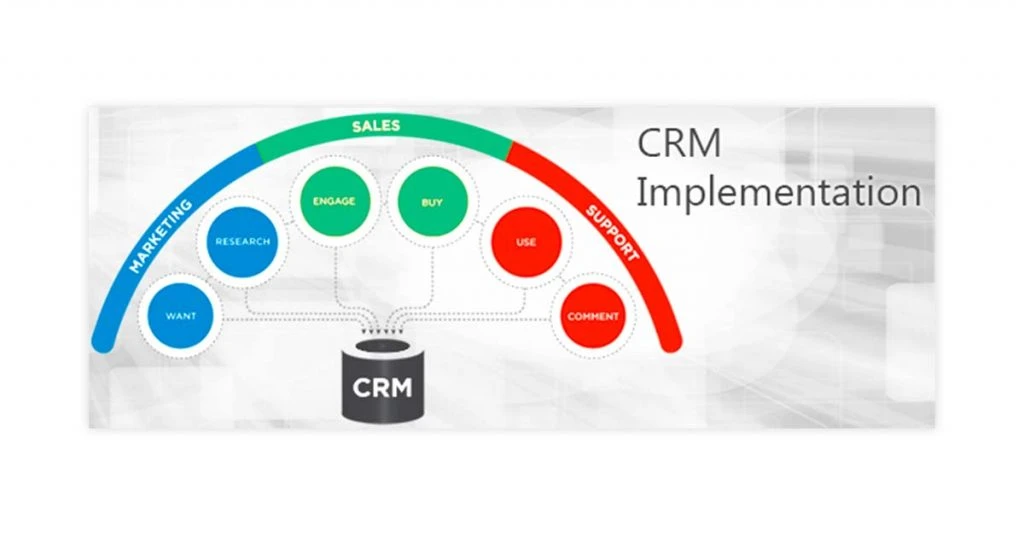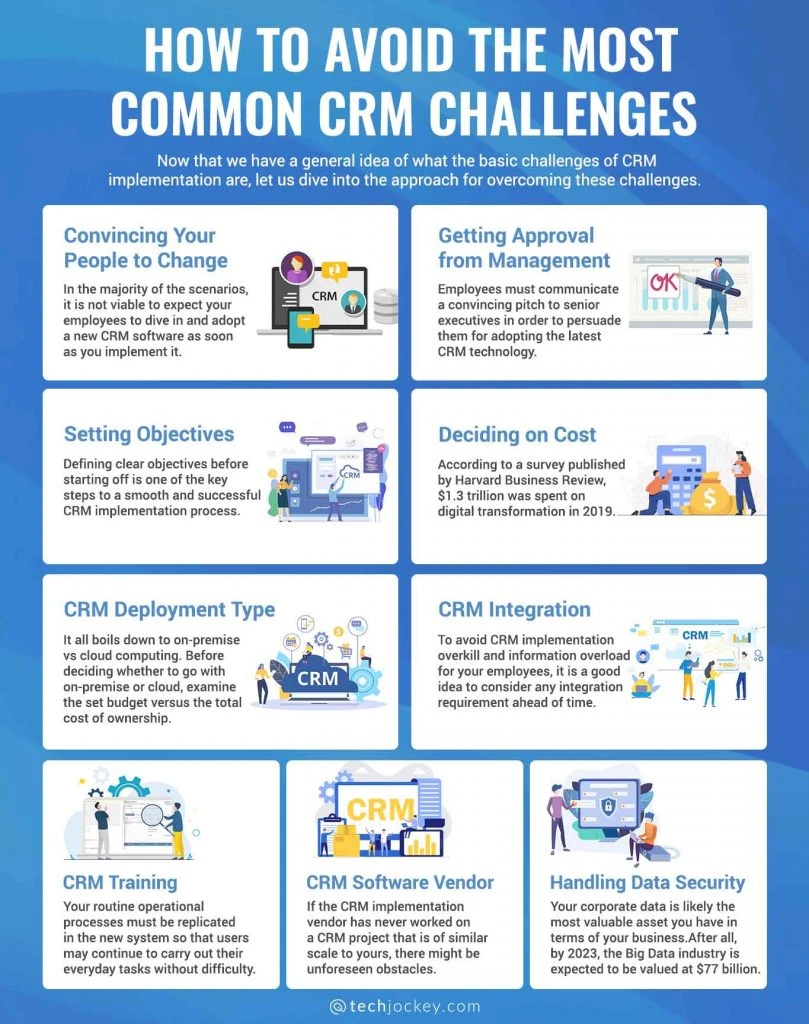5 Common Challenges of CRM Implementation and How to Avoid Them

CRM (Customer Relationship Management) is becoming increasingly important in today’s ever-expanding business world. Both large and small businesses are adopting this technological marvel. CRM helps streamline and automate your company’s day-to-day operations. It functions as a centralized database that stores all customer data and interactions.
CRM software can aid in the automation of marketing and sales activities as well as the maintenance of long-term relationship with partners, vendors, and workers. Despite all the advantages, CRM implementation comes with its fair share of challenges. Here we shall discuss those challenges and attempt to find appropriate solutions to mitigate them.
Why CRM Implementation Fails?
The foundation for a successful CRM implementation is a set of well-defined objectives. It is tough to attain business objectives that have not been stated explicitly.
An aimless purpose, unclear adoption, incalculable ROI, etc. can result from a lack of simple and measurable goals. And these in turn can lead to CRM failure.
Implementing Customer Relationship Software for businesses that does not ensure an optimal user experience is no good for an organization. One would opt only for the one that ensures higher productivity with the ease of use.
Common Types of CRM Implementation Challenges

Challenge 1: People Challenges
You might believe that the most difficult aspect of CRM deployment is mainly technological. However, that is never the case. Out of all the CRM implementation challenges you face, your people will be the most difficult to deal with.
The transition will be relatively easy for a startup with a young team. But when it comes to persuading older employees to learn how to utilize a CRM solution and modify their habits, it is a completely different game. As you know, old habits are difficult to break!
Some people will welcome change and innovation, while others might be resistant. While a CRM system can assist your company to break down barriers, just changing how everything is done in your marketing, sales, and customer care departments might cause differences among your employees.
Suggested Read: Best Open Source & Free CRM Software for SMBs
Challenge 2: Technology Challenges
In the era of digitization, every other company is using some sort of software to automate tedious processes. The issue emerges when none of these systems are connected, and there is no data flow between them.
An effective CRM implementation must ensure that the CRM meets the needs of all employees, whether they are Management Users, Service Executives, Sales Representatives, or Marketing Managers.
Compatibility and integration of CRM software you choose with existing business solutions will make the adoption process smoother.

Salesforce CRM
Starting Price
$ 25.00
Challenge 3: Business Process Challenges
One feature that your CRM must have is scalability; so that it can grow along with your company. Installing a CRM with limited and fixed capacity might not be the most intelligent choice for companies. It may fit you now, but when your customer base grows, you will find your CRM failing.
Some systems come with add-on modules that make expansion simple. Choosing something like this can help prevent future update disruption and expense. Therefore, always inquire about scalable features and how your CRM of choice will grow with you.
How to Avoid The Most Common CRM Challenges?

Now that we have a general idea of what the basic of CRM implementation challenges are, let us dive into the approach for overcoming these challenges of CRM implementation.
1. Convincing Your People to Change
In the majority of the scenarios, it is not viable to expect your employees to dive in and adopt a new CRM software as soon as you implement it. Despite the fact that user adoption is important for CRM success, many organizations lack a well-thought-out strategy or plan.
In order to give end-users a thorough understanding of the system, comprehensive training programs are essential. It won’t work if you expect your team members to navigate complex screens or fill out time-consuming forms right from day one.
More than usability, your team members should be educated on the importance of incorporating the CRM system into their daily routine and how to use CRM for higher productivity.

Leadhooper
Starting Price
₹ 499.00 excl. GST
2. Getting Approval from Management
Employees must communicate a convincing pitch to senior executives in order to persuade them for adopting the latest CRM technology.
In other words, you must demonstrate how CRM implementation will benefit the organization monetarily as well as in terms of overall performance. Sales teams can attempt showcasing rival success stories to demonstrate how your chosen CRM can improve the bottom line.
Marketers may tout the advantages like increased brand awareness and image enhancement, as well as the ability to use data to get better results. Customer service representatives can demonstrate how a robust CRM system will help business to create deeper and meaningful customer relationships and spend less time dealing with complaints or service issues.
Senior managers are more inclined to adopt new technology when they have a clear idea of what the organization may gain in terms of revenue, bottom line, and productivity.
3. Setting Objectives
Defining clear objectives before starting off is one of the key steps to a smooth and successful CRM implementation process.
Make your goals measurable so you can assess the system’s ROI and primary benefits. The next stage is to figure out what difficulties you are aiming to solve.
Discuss the main goal of implementing a CRM system with your marketing, sales, and service departments and set clear objectives. As you might know, without a clear goal, you cannot score.

Kylas CRM
Starting Price
₹ 12999.00 excl. GST
4. Deciding on Cost
According to a survey published by Harvard Business Review, $1.3 trillion was spent on digital transformation in 2019. You could be wondering if it is worth the trouble.
You may crunch the statistics ahead of time, just like any other large marketing or sales initiative, to determine the possible ROI that the shift to a CRM platform can generate.
According to research, CRM adoption has a favorable ROI, generating about $9 for every $1 spent and cutting labor expenditures by 40 percent. When assessing the costs of successful CRM implementation, keep your long-term business goals in mind. Look for ways to save money by phasing out your in-house platforms that are rarely utilized.
You may create a strategy that maximizes productivity throughout the transition from manual to automated customer relationship management software. This will ensure that costs are kept to a minimum and that training and data transfers are completed in a timely and cost-effective manner.
5. CRM Deployment Type
It all boils down to on-premise vs cloud computing. Before deciding whether to go with on-premise or cloud, examine the set budget versus the total cost of ownership. This should include costs for all the resources, maintenance, updates, infrastructure, and so on.
This can be further broken down into business preferences, the type of industry in which your company operates, and so on.
Form a specialized CRM team within the company, comprising members from top management, IT, senior executives, customer service, and end-users.
The team can take care of everyday challenges in CRM usage and suggest ways to increase efficiency. This should give you a decent idea about which deployment type is ideal for your company.

Cronberry CRM
Starting Price
₹ 2000.00 excl. GST
6. CRM Integration
To avoid CRM implementation challenges, overkill and information overload for your employees, it is a good idea to consider any integration requirement ahead of time. CRM integration is popularly used for email, calendar, social media platforms, live chat, web forms and IVR calling software.
7. CRM Training
Your routine operational processes must be replicated in the new system so that users may continue to carry out their everyday tasks without difficulty. In the worst-case situation, your CRM might be exceptionally functional but no one wants to use it.
Change should be introduced gradually, rather than all at once. Allow your employees to get to know the platform and have regular meetings to introduce new features of the system.
Your company has likely invested a significant amount of money in the new CRM, so employees must not only use it but also draw meaningful conclusions from the system. Demonstrate how it helps perform their tasks quickly and accurately.
Always keep in mind that user acceptance will be higher when newer technologies are implemented gradually and with positive reinforcement.

CrmOne
Starting Price
₹ 11999.00 excl. GST
8. CRM Software Vendor
If the CRM implementation vendor has never worked on a CRM project that is of similar scale to yours, there might be unforeseen obstacles. These barriers would be tough to overcome once the CRM implementation project is started.
In addition, the CRM vendor might be unprepared for potential implementation issues, resulting in the waste of valuable time and money. To avoid this, thoroughly evaluate your vendor’s capabilities and verify their credentials before entering into a formal contract with them.
9. Handling Data Security
Your corporate data is likely the most valuable asset you have in terms of your business. After all, by 2023, the Big Data industry is expected to be valued at $77 billion.
However, if you lose or mix up any client data, the issues of customer relationship management can become greatly exacerbated. It all boils down to selecting the appropriate CRM system.
You want a unified, CRM system that makes data import simple and intuitive, allowing your firm to access customer-relared data securely.
Furthermore, with a CRM software that has robust security features, your employees will be able to take advantage of up-to-date business data. This shall allow you to provide a better customer experience.

LeadSquared CRM
Starting Price
₹ 2500.00 excl. GST
Top CRM That Ensures Hassle-Free Implementation (EasyRewardz)
It has been proven that businesses can better engage with their customers if they know what the latter is looking for. With the right CRM platform at your rescue, achieving your business goals would be as simple as a walk in the park.
EasyRewardz is a cloud-based customer lifecycle management platform that integrates easily with your organizations’ transactional systems. It helps make the entire process swift and rewarding for both users and their clients.

Easyrewardz CRM Suite
Starting Price
Price on Request
By providing an engaging brand experience, you are likely to cultivate long-term consumer relationship. Thanks to EasyRewardz 360° customer lifecycle management solution, companies can now harness the potential of personalization by analyzing data at every stage of the customer journey. Sounds impressive, right?
Suggested Read: What is Operational CRM: Uses, Benefits, Features
Conclusion
CRM challenges can cost your company a lot of money and valuable time. Additionally, you risk losing the trust of your staff and consumers. The good news is that all these challenges can be overcome with the right intent, strategy, and effort.
CRM solutions are no longer exclusive to major corporations. What was once a prohibitively expensive technology is now accessible to any business, regardless of size.
Keep in mind that CRM deployment, like any major business shift, involves patience, effort, and some investment. We hope that this article helps you to overcome the above-mentioned CRM issues. Get ready to boost your business operations!
FAQs
Why is implementation of CRM important?
CRM implementation is important manage your customers’ details and to offer them personalized services based on their needs and preferences.
How to implement CRM strategy?
To implement an effect CRM strategy, you need to set and prioritize your goals, bring your customers on the same page, and integrate your existing solution to CRM.
How long does CRM implementation take?
It varies from vendor to vendor. On average, CRM implementation takes 4 to 6 business days.
What are the different types of CRM implementation?
There are four major types of CRM implementation; analytical CRM, operational CRM, collaborative and strategic CRM.
The Techjockey content team is a passionate group of writers and editors dedicated to helping businesses make informed software buying decisions. We have a deep understanding of the Indian software market and the challenges that businesses face when choosing the right software for their needs. We are committed... Read more





























